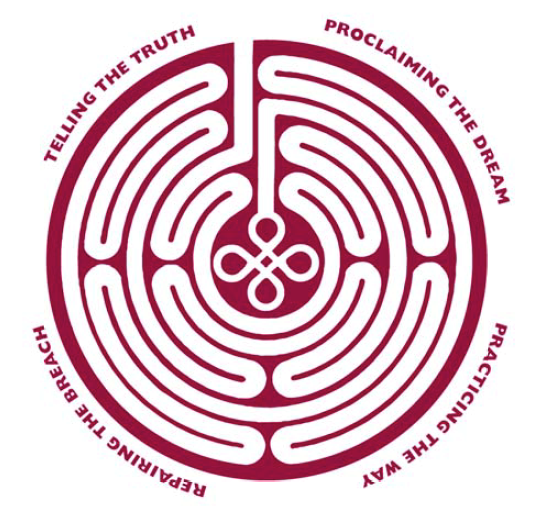Racial Reconciliation, Healing, and Justice-making
Responding to Racist Violence
LEARN, PRAY, ACT: Resources for Addressing Racist Violence and Police Brutality
From OGR: 9 actions you can take today to learn about and address police violence in your communities
Reparations
The work of promoting and fostering racial justice and healing takes the shape of direct institutional change and response as well as advocacy for public change. The Episcopal Church advocates for a Congressional commission to study reparations and draft proposals for the government moving forward. Please join in asking Congress to establish this important commission.
Learn more about Episcopal Church initiatives: Virginia Theological Seminary, Diocese of Georgia, Diocese of New York, Memorial Episcopal Church, and others in Maryland
Criminal Justice Reform
We maintain relationships in coalitions dedicated to broad criminal justice reform with the aim of achieving positive long-term advancements in our criminal justice system. As with all of our work, we are engaged in federal-level advocacy and seek to end mass incarceration.
EPPN Criminal Justice Series
Published Jan-Feb 2020
- Introduction: 13th Amendment
- School-to-Prison Pipeline
- Public Defenders
- Sentencing
- During Incarceration
- Re-entry
Police Reform
The Episcopal Church continues to commit to addressing police violence and discrimination by advocating for alternatives to deadly force, taking action to eliminate racism, and supporting the civil rights of those who have disabilities in interactions with law enforcement.
9 Actions on Police Reform – A list of actions you can take today to learn about and address police violence in your communities
Partner Resources
Episcopal Church Statement on White House Pardons (10/7/2022)
Sign on Letters
13th Amendment
While the 13th Amendment of the Constitution is understood to have ended the institution of slavery in 1865, the language of the amendment itself does not categorically abolish slavery. When Congress passed the 13th Amendment, the language included an exception for individuals that had been convicted of a crime. Act now by urging your elected representatives to cosponsor and support the joint resolution proposing an amendment to the Constitution of the United States to end the exception in the 13th Amendment by prohibiting slavery and involuntary servitude as a criminal punishment (H.J.Res.72/S.J.Res.33).
National Hymn
The song “Lift Every Voice and Sing” speaks to the faith and resilience of African Americans. The song’s lyrics were written by James Weldon Johnson. His brother, John, set the poem to music and performed the song to commemorate Abraham Lincoln’s birthday in 1900. The words found in “Lift Every Voice and Sing” reflects on the hardships Black Americans face and captures the community’s commitment to God in pursuit of freedom. ”Lift Every Voice and Sing” became a civil rights anthem, adopted by the Civil Rights Movement and the NAACP as a rallying cry during the 1950s and 1960s. The song continues to be embraced by movements like Black Lives Matter and reinvented by Black artists as a new generation continues the fight for Black pride and liberation. Please join us in urging your members of Congress to introduce and support legislation to commemorate the song’s lasting ode to Black Americans and freedom.
Indigenous Issues
Indigenous issues encapsulate many areas including land rights, sovereignty, healthcare, environmental issues, racial justice, education, and much more. This set of issues cannot neatly fit under a single title, though it is often grouped together with racial justice given some parallels with issues that other groups also face.
The Episcopal Church has long been committed to advocating in support of Indian Nations and Tribes, including the efforts to protect and honor treaty rights and their right to self-determination. More recently, the Church affirmed our commitment at the 80th General Convention to advocate for national legislation and policy that would address inequities in healthcare, education, nutrition, and housing that are detrimental to the quality of life of American Indians, Alaska Natives, and Native Hawaiians.
Please also see the work of the Indigenous Ministries.
Native American Heritage Month (11/23/2022)
Becoming Beloved Community
As the Episcopal branch of the Jesus Movement, we dream and work to foster Beloved Communities where all people may experience dignity and abundant life and see themselves and others as beloved children of God.
The Becoming Beloved Community Vision Document and accompanying resources help us to understand and take up the long-term commitments necessary to form loving, liberating and life-giving relationships with each other. Together, we are growing as reconcilers, justice-makers, and healers in the name of Christ. The work of policy advocacy factors most into healing and justice-making elements of this broader work.
One of the entry points into this framework is “Repairing the Breach in Society and Institutions,” which asks:
- What institutions and systems are broken?
- How will we participate in repair, restoration, and healing of people, institutions, and systems?
Responding to these questions requires engaging in public policy advocacy as a means of healing and justice-making. The Office challenges long-established policies that perpetuate systemic racism and injustice and strives to change legislation that continues to harm communities of color. The Episcopal Church aims to bring a perspective of transformation to public policy in order to heal communities that have been the most marginalized and discriminated against.
Check out the full Becoming Beloved Community framework.

Contact:
The Office of Government Relations
eppn@episcopalchurch.org

